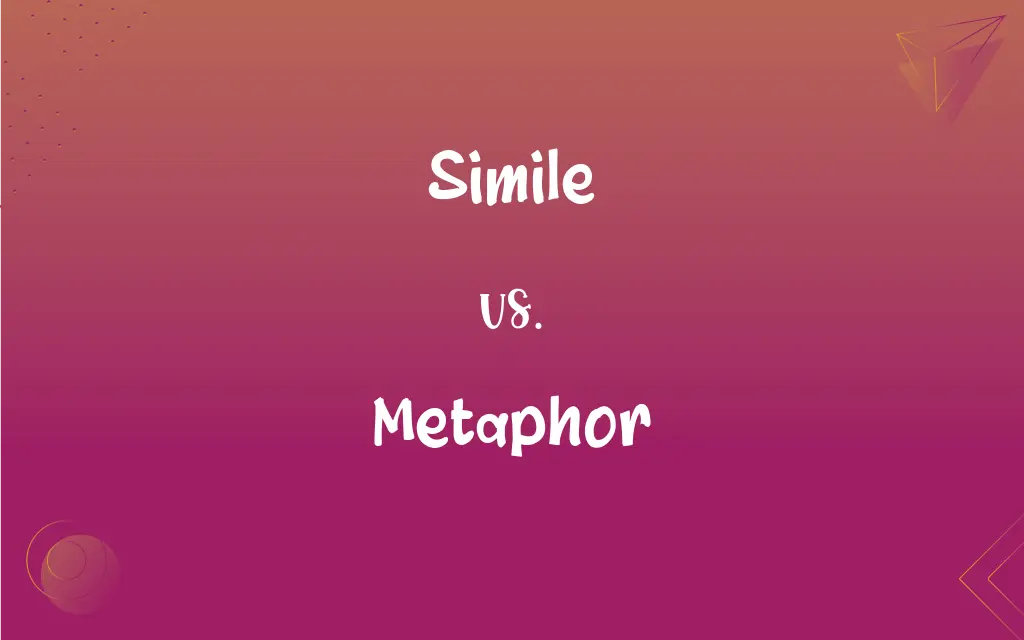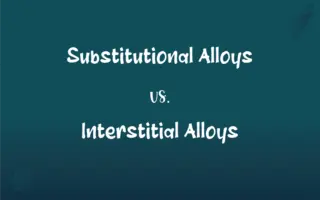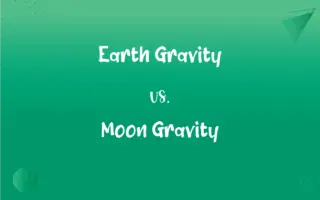Simile vs. Metaphor: What's the Difference?
Edited by Janet White || By Harlon Moss || Updated on October 20, 2023
A simile compares two things using "like" or "as"; a metaphor states one thing is another without a direct comparison.

Key Differences
A simile is a figure of speech that draws a comparison between two different things using the words "like" or "as." It allows for a more vivid understanding or visualization of the subject. A metaphor, conversely, makes an assertion that one thing is another, effectively stating they are equivalent, without employing "like" or "as."
The beauty of a simile lies in its ability to highlight specific similarities between disparate entities. For example, saying "Her smile is like sunshine" brings forth the brightness and warmth of sunshine to describe her smile. On the other hand, a metaphor might declare, "Her smile is sunshine," merging the two concepts and giving the smile all the attributes of sunshine directly.
Both simile and metaphor are powerful tools in the realm of literature and everyday language, used to enrich expressions and make them more evocative. A simile provides clarity by underlining particular likenesses, making statements like "He fights like a lion" come to life. A metaphor's strength resides in its boldness, with declarations such as "The world is a stage" demanding attention and contemplation.
While both figures of speech aim to elucidate and enhance, the key distinction remains in their approach. A simile maintains a semblance of separation between the compared entities, while a metaphor wholly identifies one with the other. This difference influences not only their construction but also their impact on the reader or listener.
Comparison Chart
Definition
Comparison using "like" or "as"
Direct assertion without "like" or "as"
ADVERTISEMENT
Function
Highlights specific similarities
Equates concepts, implying deeper likeness
Construction
Maintains distinction between entities
Merges two entities into one
Example
"Her cheeks are red like roses."
"Her cheeks are roses."
Usage
Clarifies or emphasizes particular traits
Presents a bolder, often symbolic, equation
Simile and Metaphor Definitions
Simile
An expression that maintains distinction while drawing parallels.
The night sky sparkled like a blanket of diamonds.
ADVERTISEMENT
Metaphor
A direct assertion without employing "like" or "as."
The classroom was a zoo.
Simile
A comparison of two things using "like" or "as."
His voice was as smooth as silk.
Metaphor
A tool in literature that merges distinct entities for deeper meaning.
He's not a businessman, he's a business, man!
Simile
A figure of speech that emphasizes likeness.
She was brave like a lioness defending her cubs.
Metaphor
A figure of speech that equates one thing to another.
Time is a thief.
Simile
A tool in literature to vividly depict one entity in terms of another.
His anger bubbled up like a volcano.
Metaphor
An expression that presents a symbolic equation.
Dreams are the playground of the mind.
Simile
A device that enhances imagery and evokes specific attributes.
The snow fell like a cascade of tiny white stars.
Metaphor
A statement that identifies one concept with another.
His heart is a fortress, impenetrable and cold.
Simile
A figure of speech in which two essentially unlike things are compared, often in a phrase introduced by like or as, as in "How like the winter hath my absence been" or "So are you to my thoughts as food to life" (Shakespeare).
Metaphor
A figure of speech in which a word or phrase that ordinarily designates one thing is used to designate another, thus making an implicit comparison, as in "a sea of troubles" or "All the world's a stage" (Shakespeare).
Simile
A figure of speech in which one thing is explicitly compared to another, using e.g. like or as.
Figure of speech
Simile
A word or phrase by which anything is likened, in one or more of its aspects, to something else; a similitude; a poetical or imaginative comparison.
A good swift simile, but something currish.
Simile
A figure of speech that expresses a resemblance between things of different kinds (usually formed with `like' or `as')
FAQs
Why are similes popular in poetry?
Similes vividly depict emotions, settings, and characters by drawing relatable comparisons.
Can similes be extended in descriptions?
Yes, similes can be elaborated for more in-depth imagery and context.
Do metaphors only pertain to literature?
No, metaphors are prevalent in everyday language, ads, music, and more.
Why are metaphors impactful in speeches?
Metaphors offer bold, memorable equations, resonating with listeners.
Is "as brave as a lion" a simile?
Yes, it compares bravery using "as."
Are similes always positive comparisons?
No, similes can draw both positive and negative parallels based on context.
Can metaphors be visual, not just verbal?
Absolutely! Visual metaphors are common in art, advertising, and visual media, symbolizing concepts without words.
Can I use both simile and metaphor in one sentence?
Absolutely, both can coexist in a sentence for richer expression.
Can a simile evolve into a metaphor with slight changes?
Absolutely. "Life is like a roller coaster" (simile) can become "Life is a roller coaster" (metaphor).
Is it essential to know the difference between simile and metaphor?
While both enrich language, understanding their distinction refines comprehension and expression.
What makes a metaphor effective?
An effective metaphor resonates with the audience and offers new insight or perspective.
Can metaphors become clichés?
Yes, overused metaphors can lose their impact and become clichéd.
Which is more direct, a simile or a metaphor?
A metaphor is more direct as it equates two things without using "like" or "as."
Are similes only found in English literature?
No, similes are universal and appear in many languages and cultures.
Why do authors use similes?
Similes provide clarity, evoke emotions, and enrich narrative imagery.
Is "as clear as mud" a simile?
Yes, it ironically compares something unclear to mud using "as."
Can metaphors be humorous?
Definitely! Metaphors can be witty, offering playful or ironic equations.
Which is older, simile or metaphor?
Both have ancient origins, used in oral traditions and early written texts.
If I say "Life is a roller coaster," is that a metaphor?
Yes, it's equating life with the ups and downs of a roller coaster.
What's an extended metaphor?
An extended metaphor continues throughout a passage, offering multiple linked comparisons.
About Author
Written by
Harlon MossHarlon is a seasoned quality moderator and accomplished content writer for Difference Wiki. An alumnus of the prestigious University of California, he earned his degree in Computer Science. Leveraging his academic background, Harlon brings a meticulous and informed perspective to his work, ensuring content accuracy and excellence.
Edited by
Janet WhiteJanet White has been an esteemed writer and blogger for Difference Wiki. Holding a Master's degree in Science and Medical Journalism from the prestigious Boston University, she has consistently demonstrated her expertise and passion for her field. When she's not immersed in her work, Janet relishes her time exercising, delving into a good book, and cherishing moments with friends and family.































































